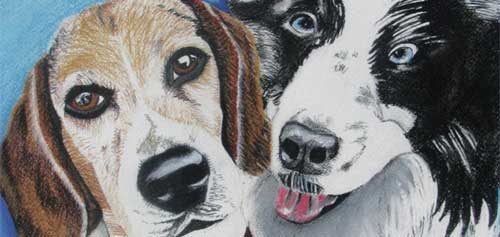

Redefining What it Means for Dogs to Grow Older: Secrets for Healthy Aging
Sponsored by Leap Years
When Mowgli was eight years old, his mom noticed subtle changes — slightly slower recovery after hikes and a little less eagerness to chase his younger canine brother. Wanting to keep him active and engaged as he aged, Mowgli’s mom introduced Leap Years, a healthy aging supplement. Within a few weeks, she noticed meaningful differences: Mowgli became more animated and engaged; his stamina during hikes improved, and he showed renewed enthusiasm for training. Now, two years later at age ten, Mowgli continues to enjoy long hikes, play sessions with his brother, and remains the same wise, resilient companion — with only mild stiffness after intense activity.
Geroscience and the Emerging Field of Canine Healthy Aging
The story of Mowgli reflects a broader evolution in veterinary medicine. Geroscience, the study of healthy aging, is a field of study in people as well as in dogs. Knowing a few tips about managing middle age and senior years for different sized dogs goes a long way in supporting dogs to live healthier, enjoying a longer health span. Leap Years is part of this new frontier. Created by a team of dedicated veterinarians and backed by a clinical trial in dogs with published results, the system combines NAD+ support with a senolytic compound. This ingredient helps the body naturally remove old or senescent cells to make way for new, healthier cells. Together, these two mechanisms address the root cause of aging at the cellular level.
In addition to healthy aging supplements, pet parents who want to optimize a long, healthy life begin with proactive whole dog strategies.
1. Regular Wellness Exams
Supporting healthy aging in dogs begins with proactive veterinary care. Routine checkups help detect age-related conditions early, allowing for treatment and adjustments. Preventive dental care also plays a role in disease prevention, rounding out a holistic approach to aging well.
2. Nutrition
Senior dogs benefit from diets tailored to their changing needs—some specialty formulas support joint health, digestion, and cognitive function. Supplements can help fill specific nutritional gaps and help manage age-related issues.
3. Weight Condition
Maintaining a healthy weight is crucial, as excess pounds can strain aging joints and organs.
4. Mobility and Environment
Equally important is preserving mobility and mental wellness. Daily exercise, such as walking or swimming, helps keep muscles strong and joints flexible. Home modifications like ramps, non-slip mats, and orthopedic beds reduce physical stress and prevent injury.
5. Cognitive and Emotional Health
Mental stimulation through puzzle toys, training games, and consistent routines helps combat cognitive decline and anxiety.
Tailoring Care by Size and Breed
- Small Dogs (under 25 lbs.): When supporting healthy aging in dogs, size plays a major role in shaping care strategies. Small dogs tend to live longer but are prone to dental disease, heart murmurs, and luxating patellas. Regular dental cleanings, gentle joint support, and routine cardiac checkups are important. Because their exercise needs are modest, short walks and indoor play are usually sufficient to keep them active and content.
- Medium dogs (25–55 lbs.): often face a mix of joint and metabolic issues. It is important to maintain a balanced diet, monitor weight closely, and provide moderate daily exercise. These dogs benefit from routine screenings for conditions like hypothyroidism or arthritis. Mental stimulation—like puzzle toys or scent games—helps preserve cognitive health.
- Large and giant breeds (over 55 lbs.): age faster and are more prone to hip dysplasia, arthritis, and bloat. Focus on weight management, low-impact activities like swimming, and orthopedic support. Feed smaller, more frequent meals to reduce bloat risk, and consider elevated bowls. Because their lifespan is shorter, early detection of age-related conditions is critical—bi-annual vet visits are key.
As dogs transition from adulthood to middle age (roughly 5–8 years depending on size), preventive care becomes essential. Middle-aged dogs benefit from early screenings for joint, dental, and metabolic issues. Adjusting their diet to support weight control and adding a healthy aging supplement like Leap Years can support their cellular health. A joint supplement may address impending arthritis. Regular, moderate exercise maintains muscle tone and cardiovascular health. Mental stimulation—training refreshers, puzzle toys, and scent games—keeps their minds sharp. This stage is ideal for establishing routines that support long-term wellness.
Senior dogs (typically 8+ years for large breeds, 10+ for small) need more tailored support. Biannual vet visits help monitor chronic conditions like arthritis or cognitive decline. Diets should be lower in calories but rich in nutrients. Exercise should be gentle—short walks, swimming, or stretching—to avoid strain. Home modifications of ramps, non-slip mats, and orthopedic beds improve comfort. Seniors also benefit from consistent routines, emotional support, and mental engagement to reduce anxiety.
Mowgli’s story reminds us why Leap Years was created—to help our best friends stay their happy, healthy selves for as long as possible. Supporting cellular health early means more good days, more long walks, more eager tail wags, and more “just like themselves” moments that make every day together count. Leap Years is redefining what it means for dogs to age gracefully. Our best friends deserve not just more years, but more life in every year. For more information on Leap Years, click here.
For more articles like this, check out our Dog Life page.
Join the newsletter and never miss out on dog content again!
"*" indicates required fields
By clicking the arrow, you agree to our web Terms of Use and Privacy & Cookie Policy. Easy unsubscribe links are provided in every email.







